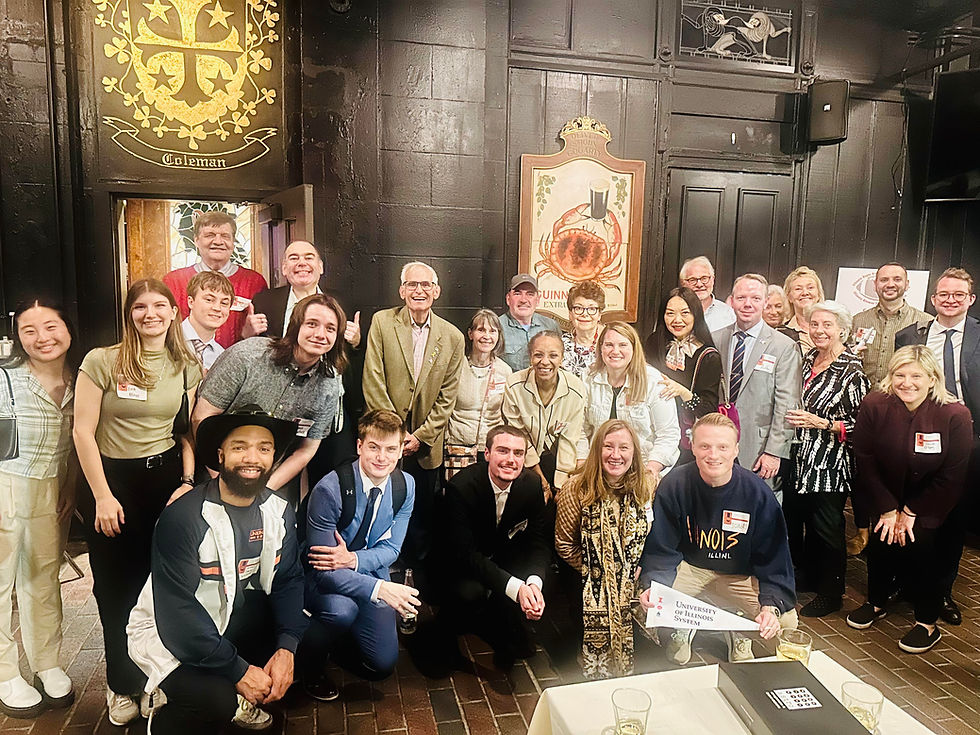From Deep Dish to the Papal Dish: Chicago’s Own Becomes Pope Leo XIV
- Illinois State Society of Washington, DC
- Jul 31, 2025
- 4 min read
When smoke rose above the Sistine Chapel and the world learned that the new pope hailed not from Rome or Buenos Aires—but from Chicago—the Windy City let out a collective, “You’re kidding me, right?” But it was no joke. Cardinal Robert Francis Prevost, born at Mercy Hospital and raised in the south suburb of Dolton, has officially become Pope Leo XIV, the first-ever pope from the United States.
Cue the memes. Cue the Aurelio’s pizza deliveries to Vatican City. Cue the transformation of the papacy into something Chicagoans can now call their own.
But beneath the social media frenzy and sports banter is a deeper story—a story of cultural significance, global representation, and a faith leader uniquely poised to meet this moment.
A Pope from the People
Pope Leo XIV is not a career bureaucrat or cloistered academic. Before Rome, there was Peru. Before Peru, there was Chicago. Raised by a working-class family in the heart of the Midwest, Prevost's pastoral path took him across continents. For decades, he lived and worked as a missionary and bishop in Peru, often in underserved communities. He speaks five languages. He’s dealt with real-world crises—from poverty to church reform to political instability.
That background matters. This pope wasn’t groomed in the Vatican corridors of power. He earned his credibility at ground level, shepherding communities through complex social and spiritual challenges. It’s a pastoral style—relational, pragmatic, human. And it tracks with what Pope Francis had been calling for: a more humble, listening Church. Leo XIV fits that mold—and brings an American sensibility to the global stage.
The Name Says It All
When Cardinal Prevost chose the name Leo XIV, he wasn’t just pulling from a papal grab bag. The last Pope Leo—Leo XIII—was known for his bold engagement with modernity. He addressed workers’ rights, capitalism, and the role of the Church in an increasingly industrialized world. Fast forward to today, and Leo XIV faces a similar crossroad: AI, global migration, climate change, and fractured political landscapes.
The new pope’s name signals intent. He’s not just inheriting tradition—he’s ready to wrestle with it, reinterpret it, and move it forward.
Chicago Style—No Ketchup
If you’ve been online in the past 72 hours, you’ve probably seen the jokes. “Deep Dish Eucharist.” “Popemobile now stocked with Italian beef.” Even Chicago’s own Wieners Circle got in on the action, projecting a welcome message on their sign (with their signature flair).
But underneath the punchlines is real pride. Chicago has long been a city of immigrants and resilience, a city of contradictions and communities that work together despite deep divides. It’s a city that understands power and humility, grit and grace.
And now, it’s a city with a pope.
Chicago’s Catholic roots run deep—from the working-class Polish parishes on the Northwest Side to the African-American Catholic traditions on the South Side. The idea that someone from that mix—someone who grew up riding the CTA and eating at White Castle—could ascend to the highest office in Catholicism? It’s as profound as it is improbable.
What It Means for the Global Church
This isn’t just a win for Chicago. It’s a shift for the Church at large.
A new voice on tech and ethics: Leo XIV has already hinted at convening an international council on AI and its ethical implications. As governance struggles to keep pace with machine learning, he wants the Church to be part of the solution—not a passive observer.
A deeper focus on youth: At a recent event in St. Peter’s Square, Leo XIV made a surprise popemobile appearance at the Jubilee Youth Festival, telling young people in five languages that they are “the light by which we see the future.”
A bridge-builder in fractured times: His global background—deeply American, Latin American by mission, and multilingual—makes him uniquely suited to bridge divides in a polarized world. The Church under his leadership may become less about “left” and “right,” and more about service and solidarity.
Faith, Humor, and Humanity
In his first public address, Leo XIV didn’t just bless the crowds. He cracked a smile when a group of Chicago pilgrims held up a sign reading, “You can take the pope out of Chicago, but you can’t take the Sox out of the pope.”
He grinned and gave a subtle wave. Not quite a confirmation, but close enough.
And maybe that’s what the world needs right now: not just a leader of ritual, but a leader of relatability. Someone who understands that to be holy is not to be aloof, but to be human, accessible, and occasionally funny. After all, he’s not afraid to be called “Da Pope.”
A Final Slice of Reflection
This moment is historic. But it’s also instructive. In Pope Leo XIV, we see a shift away from insular leadership and toward grounded, globally aware stewardship. We see the power of origin stories—and the value of experience beyond the Vatican walls. We see what happens when authenticity meets authority.
And yes—we see what happens when a South Side Sox fan trades his cap for the Fisherman’s Ring.
So here’s to Pope Leo XIV. May he lead with wisdom, courage, and the kind of deep-dish empathy the world sorely needs.
And may his journey—like all good Chicago stories—inspire, challenge, and surprise us.
Let me know if you’d like this formatted for Medium, LinkedIn, or your org’s blog CMS. I can also generate a square social caption and hero image prompt to match.





